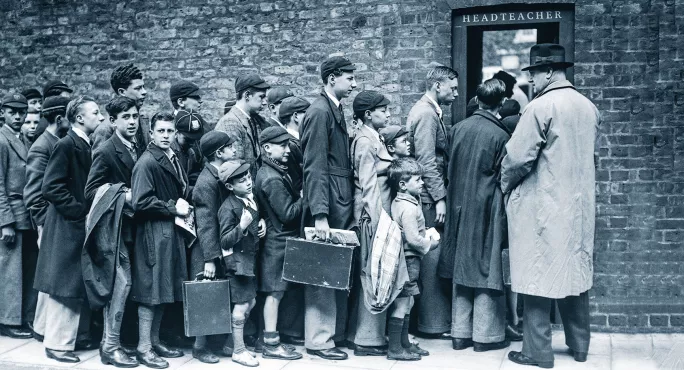Why the job of a head is hugely demanding - and uniquely fulfilling

For all the pressure on headteachers and the ever-growing list of responsibilities they take on, Jim Thewliss finds it hard to think of a better job than leading a school.
Thewliss will retire as general secretary of School Leaders Scotland (SLS) next summer after seven years in the job, following 18 years as head at Dundee’s Harris Academy from 1997 to 2015 - and he has seen a lot change in that time.
But at least one thing is constant in the life of a headteacher: the knowledge that, if you do the job well, you can be an influence for the better on thousands of lives.
“The most fulfilling thing about being a headteacher is being entrusted by a community for the life chances and wellbeing of their children,” says Thewliss. “It’s repeated 1,000 times: seeing someone walk out the door being the better for having been at the school - and that’s not just kids, it’s staff, too.”
The job of secondary headteacher has changed markedly since 1997, says Thewliss, with a quite head-spinning array of things for the modern head to think about - it was no surprise to Thewliss when the Muir report in March identified 40 policy areas that secondary heads have to be on top of (it was 34 for primary heads).
But he stresses that there is more support for heads now. The establishment of the Scottish College for Educational Leadership (now part of Education Scotland), for example, was central to “more formal, more structured” approaches to school leadership than before.
Back in 1997, in contrast, headteachers often ploughed a more lonely furrow, and if they had a supportive network of people around them that was more down to luck than planning at a national level.
“I was fortunate enough to have good people around me,” says Thewliss of his early days as a head.
- SLS conference: Scottish heads meet face to face, so what are they talking about?
- Muir report: Somerville defends move to reject key recommendation on SQA
- Analysis: How school leaders can fuel interest in Scottish education reform
- Headteacher view: How to make Scottish education reform run like clockwork
The role of headteacher was “becoming increasingly more challenging and more demanding” even before Covid ramped up the pressure to another level. On the other hand, Thewliss believes the “absolutely astounding” response to the pandemic of heads and their staff has enhanced the reputation of the profession.
He also believes that professional associations such as SLS are emerging stronger from the pandemic because that protracted crisis saw them working more closely with government, leaving policymakers in no doubt about “what actually happens in schools and the impact of decisions they make at a higher level”.
A big change for SLS during Thewliss’ tenure has been that it is now working directly with the Scottish Negotiating Committee for Teachers (SNCT). The SNCT is the body, comprising teaching unions and local and national government, that determines teacher pay and conditions, and he says the closer working relationship helps ensure that the SNCT understands “the things which are important to school leaders”.
While members of the AHDS - the equivalent primary school leaders’ body - backed strike action over pay in a recent ballot, SLS members did not. Thewliss has in his sight a different “running sore” in Scottish education: job sizing, the process by which the responsibilities and related salary of a particular role is determined. Now, however, he believes that a closer working relationship with the SNCT means a fresh look at the job sizing of headteacher roles is more likely.
While Thewliss wants to see the “job sizing toolkit” reflect the greater responsibility placed on headteachers these days, he stresses that many aspects of the broadened remit of heads are to be welcomed.
The inspection regime in Scottish schools has, for example, “shifted enormously over the past 20 years”, with the “gamechanger” being the How Good is Our School? approach, which sees schools “empowered to be able to judge good practice” and take a lead in building on that.
“Before, what happened was inspectors came through the doors of the school and wrote a story after having been with you for a week, which reflected perhaps what they found out during that week but perhaps was not totally reflective of the school,” says Thewliss. “The inspection process now is much more of an engagement, and engagement based on the school’s self-evaluation of its position, [which leads to] a much more productive discussion.”
And, as a result, he says that “the number of very poor school inspections has dropped enormously”.

If Thewliss could change one thing about Scottish education overnight, he would like to see even more empowerment of school leaders. He recalls that former education secretary John Swinney was a big advocate of devolving more responsibility to schools, but that this idea seemed to have been “kicked into the long grass”, partly as a result of Covid - a source of “huge frustration”.
“I’m absolutely convinced that if school leaders were empowered in the way John Swinney originally suggested, it would make a massive improvement to the life chances of young people,” says Thewliss.
He says that school leaders have proven themselves highly capable of handling more responsibility over curriculum planning and school improvement, so should also be given more of a say over staffing and finance.
He argues that school leaders’ handling of funding in a more limited way, through the Pupil Equity Fund (PEF) and the Scottish Attainment Challenge (SAC), shows they would be more than capable of even greater control of purse strings.
The idea of greater empowerment, indeed, is what Thewliss predicts will be one of three top priorities for his successor.
The second (and related) priority is the push for fairer funding and staffing formulas. Thewliss says that two schools that are geographically close to each other - but on different sides of local authority boundaries - could have an identical pupil roll, but one might end up with 10 more staff than the other, because of the vagaries of local staffing formulas. Thewliss would prefer standardised formulas (which funding streams such as PEF and SAC could add to) to remove such disparities.
“Why in a country the size of Scotland do we not say let’s have a basic minimum funding for every school?”
Thewliss’ third priority for the new SLS general secretary is headteacher salaries. In Scotland, he says, heads are routinely paid at least 25-30 per cent less than those in comparable, local authority schools in England, Wales and Northern Ireland.
The unwillingness of promoted teachers to make the jump up to headteacher has long been a thorny issue in Scotland, and Thewliss believes it will never go away unless salary structures are looked at.
“The level of expectation between depute and headteacher is enormous, and it is not reflected in any way in the existence of clear blue water between headteacher and depute salaries.”
Thewliss, who worked with 100 staff and 1,500 students at Harris Academy, says that “I never realised how all-consuming it was until I stopped doing it”.
“In the end, the headteacher is the person who is held overall accountable for what happens within the school, and you’ve got to live with that responsibility,” he says. “I had a hugely effective and supportive senior leadership team around me, but the headteachers have got to make the decisions.”
Thewliss brings his decades of experience to bear when asked what his advice would be to someone just starting out as a head.
He cautions against setting out your own definitive expectations for the school from the start: “You’ve got to be very, very careful - the school has got to find itself comfortable with you, and you’ve got to find yourself comfortable with the school.”
Thewliss was “a wee bit fortunate” in that there had been a recent inspection when he started at Harris Academy in 1997, so he could use that to suggest ways forward without it appearing as if he was laying down the law himself.
“If you use things which are already there, carefully, if you start to observe the way in which the dynamic of the school works, you can then gradually work yourself into it and bring your own perspectives on things,” he says.
Thewliss believes it is also crucial for heads to surround themselves with staff who feel able to pipe up when they think something won’t work - “so we never actually got to a position where we put something in place and it bombed, because we were able to have a conversation before that point”.
“One of the most important things I learned early on in my career was that I’ve got to have people round about me who will challenge me,” he says. “Fortunately, I got myself into a position of having a senior leadership team who were quite able to say, ‘Boss, that’ll no happen’.”
Thewliss has been a qualified teacher since 1976 - geography was his subject - and says the “positive change in Scottish education [since then] has been astounding, and what the profession has done to improve itself has been astounding”.
He pinpoints two key events, both in 1986. First, the introduction of Standard Grade and, with it, the “whole notion that every child had value”, which “placed an obligation upon the profession to actually engage with the learning and the life chances of all the children”.
Previously, students deemed less academic would, as Thewliss recalls, often be given a clear message by teachers to “do what you like and we’ll collude with you doing what you like, as long as you don’t cause too much trouble”.
Meanwhile, the More Than Feelings of Concern report on guidance and personal development promoted “the whole notion of young people’s education and personal wellbeing being the responsibility of all teachers” - helping to transform the idea of “what schools were for” beyond the racking up of academic qualifications.
And Thewliss believes a report published in March 2022 may prove to be just as seminal: Professor Ken Muir’s report on Scottish education reform.
“If implemented, [it] would sit up there with that level of system change…if the profession has the courage of [Muir’s] convictions, the horizons just open up in terms of what young people can get from school.”
That positivity drives Thewliss’ view of the future. For all the difficulties he sees facing Scottish education, he is as big a cheerleader for his profession as he has been at any point since he entered it in the 1970s.
“I can’t think of a reason I would not recommend a career in teaching to anybody,” he says.
Jim Thewliss was talking to Tes Scotland editor Henry Hepburn
You need a Tes subscription to read this article
Subscribe now to read this article and get other subscriber-only content:
- Unlimited access to all Tes magazine content
- Exclusive subscriber-only stories
- Award-winning email newsletters
Already a subscriber? Log in
You need a subscription to read this article
Subscribe now to read this article and get other subscriber-only content, including:
- Unlimited access to all Tes magazine content
- Exclusive subscriber-only stories
- Award-winning email newsletters
topics in this article



